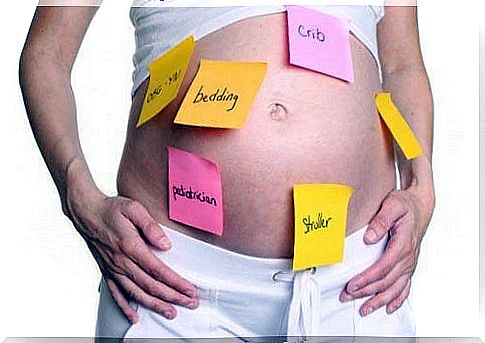To-do List For Pregnant Women

Especially if it’s your first time being a mother, this to-do list for pregnant women will help give you a little more clarity when thinking about what you need to know and remember as you prepare for the day of delivery.
Start doing these little tasks as soon as you know how long you’ve been pregnant.
To-do list for pregnant women
first trimester
- Start taking a vitamin supplement if you haven’t already.
- Write the dates of your last three menstrual cycles.
- With your partner write a history about your family’s health, in which you should include disorders or illnesses that close relatives have or have had.
- Stop smoking if you smoke. Also drop other unhealthy habits (you should have done this even during the conception process).
- Decrease the amount of caffeine you consume.
- Check with a doctor to find out if you need to stop taking any medications that you take regularly.
- Establish a balanced, nutrient-rich diet.
- Control the level of physical activity.
- Start consulting reliable sources to learn about important aspects of motherhood.
- Download an app to your mobile phone or use some other method to record important facts during pregnancy.
- Drink plenty of water.
- Find out which health centers your insurance is covered by.
- Ask your family or your doctor what you can do when the typical pregnancy discomforts appear.
- Know the dates of the first prenatal controls, which should take place between weeks 8 and 12 of gestation.
- Buy bras that are softer and fit the needs of your new body.
- Include healthy exercise for pregnant women in your daily routine.
- Consume a sufficient amount of fruits and vegetables.
- Avoid very toxic cleaning products and, if necessary, replace your cosmetic products with milder ones.
- Have clothes that adapt to your baby’s continued growth and, consequently, your tummy.
- Keep your skin hydrated to prevent the development of allergies.
- Avoid staying in places with very high temperatures.
- Do frequent stretching exercises that keep your joints active.

second trimester
- Start thinking about what names you would like to give your baby.
- Eat smaller portions, but more often to keep your digestion regulated.
- Ahead of possible outstanding issues in your studies or in your work.
- Make sure you get enough calcium in your diet.
- If possible, sign up for a maternity course that you can share with other women who are going through the same situation.
- For the more cautious, it’s time to start a savings fund for the baby’s expenses and his first years of schooling.
- Reorganize the rooms in your house so you don’t suffer from back pain.
- Go to a doctor’s appointment to find out the baby’s gender and see if the baby’s growth and development occurred normally.
- Start looking for the furniture that will be part of the baby’s room.
- Replace your shoes with more comfortable ones. Shoes without high heels that do not harm your feet.
- Keep an eye out for any abnormal symptoms you experience to avoid further complications.
- Decide whether you will choose to breastfeed or not.
- Avoid varicose veins by constantly changing position and avoiding crossing your legs.
- Explore the possibilities for ensuring baby care when you have to go back to work.
- Get tested to discover possible conditions that could affect your health, such as gestational diabetes.
Third quarter

- If you need to travel, travel now. It is not recommended to travel long distances in the last trimester.
- Keep your blood glucose under control.
- Try to have medical appointments more often.
- If you start to notice swelling on your hands, remove rings or any other elements that may be difficult to remove later.
- Have a baby shower.
- Include more foods that contain fiber in your diet to avoid digestive complications such as constipation and hemorrhoids.
- Buy things like the stroller and car seat. You will need them to transport your baby.
- Find out about the characteristic signs of the onset of labor.
- Do conditioning exercises that prepare your body to give birth.
- Have a first aid kit for you and your baby.
- If you want to hire a nanny, start looking.
- Make sure the places where the baby will be staying are clean.
- Buy in advance everything you need for postpartum care.
- Have the suitcase that you are going to take to the hospital to hand. Put everything you need in it.
- It is very important that you get enough rest before giving birth.
- Prepare and freeze a few meals before the baby is born so you can get this work done.
- Wash the sheets and clothes you bought for the baby.









